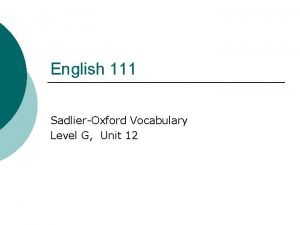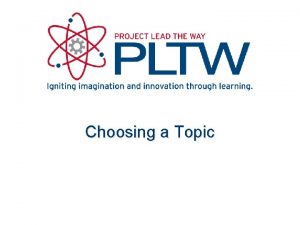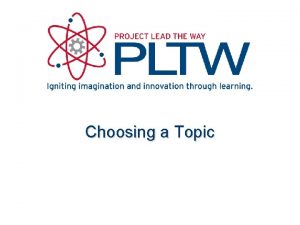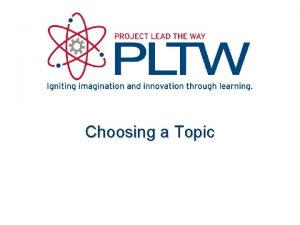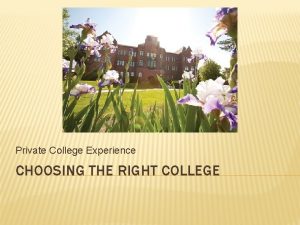Choosing the Right College Choosing the Right College
















































- Slides: 48

Choosing the Right College

Choosing the Right College 1. Start with who you are and why you are going Why, are you really going? ? What do you want out of life — something tangible or intangible? What are your abilities and strengths? What are your weaknesses?

Choosing the Right College 1. Start with who you are and why you are going A Socialite Self. Sufficient Need Supportive Relations

Choosing the Right College 2. Size matters: Your college does not have to be bigger than your high school. It is not the number of people, but the people themselves and the kind of community in which you will learn that really matters. Find out the student to staff ratio.

Choosing the Right College 3. A name-brand college will not guarantee your success. You will likely find that success in life has less to do with the choice of college than with the experiences and opportunities encountered while in college, coupled with personal qualities and traits.

Choosing the Right College 3. A name-brand college will not guarantee your success. Employers and graduate schools are looking for outstanding skills and experience, not college pedigree. As you search for colleges, ask about student outcomes; you will find many colleges that outperform the "name brands, " even though you may have never heard of them!

4. You don’t need to pick a major to pick a college. Choosing the Right College 4. You don’t need to pick a major to pick a college. You need the variety and depth of college coursework to determine your interest and aptitude. Most college students change their minds two or three times before they settle on a major, and they can still graduate in four years!

Choosing the Right College 5. Don’t be scared by the stories. If you're worried about your chances of getting admitted — and you're willing to investigate beyond the very narrow band of highly selective colleges — you'll find that you have many options that will lead to a great fit for you.

Choosing the Right College 5. Don’t be scared by the stories. Be informed about your academic profile and compare it to the most recently admitted and enrolled class for the colleges you are investigating. Check the admission Web site for this information. Ask your school counselor for additional advice and guidance as it applies to your school.

Choosing the Right College 6. You can afford to go to college. If you make the assumption that you cannot afford college based on the sticker price of tuition, you will miss out. It is difficult to talk about money, but if you investigate all the options and ask for help and advice, you will find affordable choices.

Choosing the Right College 6. You can afford to go to college. Online resources, as well as financial aid workshops sponsored by high schools in local communities, are widely available to get you started. College and university financial aid Web sites offer useful information and links as well. Investigate early and ask for help.

Choosing the Right College 7. The most important factor in choosing a college is fit. Choosing a college because your friends are going there or because of where it ranks on a list does not take into account who you are and who you will become. College is a match to be made, not a prize to be won. Finding a good fit requires time and thoughtfulness

Choosing the Right College 7. The most important factor in choosing a college is fit. Visiting college Web sites and learning about what events take place, who visits as guest speakers, and how to get in touch with current students and faculty is a good way to supplement a campus visit — or to decide if you want to spend the time and money on a visit.

Choosing the Right College 7. The most important factor in choosing a college is fit. Check a school's Web site to find the admissions officer assigned to your region of the country. Send them an e -mail to ask about getting in touch with students from your area or identifying a few with interests similar to yours.

Choosing the Right College 7. The most important factor in choosing a college is fit. When you visit, try to build in time to sit in on classes, eat in the dining hall and hang around in the student center or other high-traffic areas. That will help you imagine yourself as part of the community. Talk to a few students and ask if they would make the same college choice if they had to do it again.

Choosing the Right College 8. Type of Colleges. ELITE SCHOOLS Elite – Refers to roughly 7 schools with the most restrictive admissions criteria. • Highly Competitive • Accept fewer than 30% • Often Diverse • Come from all walks of life • Offer a High-Quality Education • High Tuition • Attract Top-Notch People • Draws best faculty & students

Choosing the Right College 8. Type of Colleges. ELITE SCHOOLS The Ivy Leagues (Pinnacle of Academic Superiority • • Brown University Columbia University Cornell University Dartmouth College Harvard University Princeton University of Pennsylvania Yale University

Choosing the Right College 8. Type of Colleges. ELITE SCHOOLS The Public Ivy Schools – State of the art facilities • College of William and Mary • State University of New York at Binghamton • University of California, Berkeley • University of California, Los Angeles • University of Florida • University of Michigan • University of North Carolina • University of Virginia • University of Washington • University of Wisconsin, Madison

Choosing the Right College 8. Type of Colleges. STATE SCHOOLS State Schools are funded largely by tax dollars so tuition is considerably less • Does not mean they are easier to get into. They want to be as competitive as Ivy Leagues • Most are large in size – small city • Greek Organizations • Intercollegiate Athletics • Student Activities • Everything is Oversized • Some thrive in this environment • Others feel lost

Choosing the Right College 8. Type of Colleges. STATE SCHOOLS • Vary in Selectivity • Limit Out of State Enrollment • Must Compete with other applicants • Academically

Choosing the Right College 8. Type of Colleges. LIBERAL ARTS SCHOOLS Academic subjects such as literature, philosophy, mathematics, and the sciences as distinct from professional and technical subjects. Both Public and Private. Most are private. • • Less Lectures Provide Personal Attention Can Be Selective Offer Great Education • Attract the Brightest Professors

Choosing the Right College 8. Type of Colleges. TWO-YEAR SCHOOLS Commonly called Technical or Community Colleges • Small Class Sizes • A Few offer 4 Year Degrees • Students that simply take classes v. living in a dorm • Start Careers that do not require a Bachelor’s Degree • Prep to 4 Year College • Getting Accepted is easier • SOME CREDITS MAY BE IMPOSSIBLE TO TRANSFER (do your homework)

Choosing the Right College 8. Type of Colleges. SPECIALTY SCHOOLS Can also be considered a Trade School • Focused Exclusively on Learning • Offer Very Little in Student Activities • Very Pricey • Acceptance is relatively easy • Career Oriented • Difficult to Transfer Credits

Choosing the Right College 8. Type of Colleges. DISTANCE LEARNING SCHOOLS • Convenient (Remote Locations) • Acceptance is relatively easy • Reputable (Sometimes) • Some offer legitimacy of a traditional school. • Acceptance is relatively easy

Questions To Ask On A College Tour

Questions To Ask On A College Tour 1. Level of academic challenge How much reading and writing do students do? In the first year? In required general education courses? In the major field in which you are interested? Is memorization emphasized? Or higher order, complex cognitive skills? How much time do students spend preparing for class?

Questions To Ask On A College Tour 1. Level of academic challenge What does the campus do to encourage students to spend significant amounts of time studying and on academic work? What do faculty and staff do to challenge and support students so they work to their potential?

Questions To Ask On A College Tour 2. Active and collaborative learning In what percentage of courses do students work in teams to complete assignments, solve problems, or apply course content? How many courses require students to engage in service learning or take part in community-based projects?

Questions To Ask On A College Tour 3. Student-faculty interaction How often do students meet with faculty members outside of class? To work on committees? To meet in faculty homes or offices? What does the institution do to promote such contacts?

Questions To Ask On A College Tour 4. Supportive campus environment What does this institution do to assure that students get the academic and social support they need to succeed and thrive? What is the nature of student relations with administrative personnel and offices? Is it cooperative?

The College Interview • Tell me about yourself – try to say something memorable here that really makes you different from other college applicants.

The College Interview • Why are you interested in our college – Be specific when answering this, and show that you've done your research. You want to highlight your intellectual interests. What specifically about the college distinguishes it from other schools you're considering?

The College Interview • What can I tell you about our college – Your interviewer will provide an opportunity for you to ask questions. Make sure you have some, and make sure your questions are thoughtful and specific to the particular college. Avoid closed ended questions.

The College Interview • Who in your life has most influenced you – Who's your hero? What historical or fictional character would you most like to be like? Spend a few minutes considering how you would answer. Identify a few real, historical, and fictional characters you admire, and be prepared to articulate WHY you admire them.

The College Interview • Why do you want to major in ___ – If you have identified a potential major, be prepared to explain why. Avoid saying that you want to major in something because you'll make a lot of money.

The College Interview • What will you contribute to our campus community – You'll want to be specific when answering this question. Think about what it is that makes you uniquely you.

The College Interview • Tell me about a challenge that you overcame – This question is designed to see what kind of problem solver you are. How do you handle situations when confronted with a challenge? College is full of challenges, so the college wants to make sure they enroll students who can handle them.

The College Interview • What do you do for fun in your free time – College life obviously isn't all work, so admissions wants students who will do interesting and productive things even when they aren't studying. Do you write? Read? Play chess? This question will show that you are well-rounded with a variety of interests.

The College Interview • What do you see yourself doing 10 years from now – Your interviewer wants to see that you have thought ahead. If you can see yourself doing three different things, say so -honesty and open-mindedness will play in your favor.

The College Interview • Does your high school record accurately reflect your effort and ability? – In the interview or on your application, you often have an opportunity to explain a bad grade or a bad semester. Be careful with this issue -- you don't want to come across as a whiner or as someone who blames others for a low grade.

The College Interview • Recommend a good book to me. – First, the question asks whether or not you've actually read much. Second, it asks you to apply some critical skills as you articulate why a book is worth reading. And finally, your interviewer might get a good book recommendation!

The College Interview • If you could do one thing in high school differently, what would it be – A question like this can turn sour if you make the mistake of dwelling on things you regret. Try to put a positive spin on it.

The College Interview • Additional Questions – What did you do this summer? – What do you do best? – What do you hope to do after graduation? – Why do you want to go to college? – How do you define success?

The College Interview • Additional Questions – Who do you most admire? – What is your biggest weakness? – Tell me about your family. – What makes you special? – What can our college offer you that another college can't?

The College Interview • Additional Questions – In college, what do you plan to do outside of the classroom? – What three adjectives best describe you? – What do you think about the latest news headline? – What high school experience was most important to you?

The College Interview • Additional Questions – Who most helped you get to where you are today? – Tell me about your community service. – If you had a thousand dollars to give away, what would you do with it? – What subject in high school did you find the most challenging?

The College Interview • Don’ts – Be Late – Under Dress – Talk Too Little – Make a Prepared Speech – Chew Gum – Bring Your Parents Into the Interview

The College Interview • Don’ts – Show Disinterest – Fail to Research the College – Lie – Be Rude
 Right time right place right quantity right quality
Right time right place right quantity right quality Right product right place right time right price
Right product right place right time right price The right man on the right place at the right time
The right man on the right place at the right time Unit 6 choosing the right pronoun
Unit 6 choosing the right pronoun Sadlier vocab level g unit 12 synonyms and antonyms
Sadlier vocab level g unit 12 synonyms and antonyms Contoh layout lokasi
Contoh layout lokasi Choosing the right cooking technique
Choosing the right cooking technique Thơ thất ngôn tứ tuyệt đường luật
Thơ thất ngôn tứ tuyệt đường luật Các châu lục và đại dương trên thế giới
Các châu lục và đại dương trên thế giới Từ ngữ thể hiện lòng nhân hậu
Từ ngữ thể hiện lòng nhân hậu Khi nào hổ mẹ dạy hổ con săn mồi
Khi nào hổ mẹ dạy hổ con săn mồi Diễn thế sinh thái là
Diễn thế sinh thái là Thứ tự các dấu thăng giáng ở hóa biểu
Thứ tự các dấu thăng giáng ở hóa biểu Vẽ hình chiếu vuông góc của vật thể sau
Vẽ hình chiếu vuông góc của vật thể sau Slidetodoc
Slidetodoc 101012 bằng
101012 bằng Lời thề hippocrates
Lời thề hippocrates Tư thế worms-breton
Tư thế worms-breton đại từ thay thế
đại từ thay thế Quá trình desamine hóa có thể tạo ra
Quá trình desamine hóa có thể tạo ra Công thức tính độ biến thiên đông lượng
Công thức tính độ biến thiên đông lượng Thế nào là mạng điện lắp đặt kiểu nổi
Thế nào là mạng điện lắp đặt kiểu nổi Dạng đột biến một nhiễm là
Dạng đột biến một nhiễm là Bổ thể
Bổ thể Vẽ hình chiếu đứng bằng cạnh của vật thể
Vẽ hình chiếu đứng bằng cạnh của vật thể Thế nào là sự mỏi cơ
Thế nào là sự mỏi cơ Phản ứng thế ankan
Phản ứng thế ankan Khi nào hổ mẹ dạy hổ con săn mồi
Khi nào hổ mẹ dạy hổ con săn mồi Thiếu nhi thế giới liên hoan
Thiếu nhi thế giới liên hoan Hát lên người ơi
Hát lên người ơi điện thế nghỉ
điện thế nghỉ Một số thể thơ truyền thống
Một số thể thơ truyền thống Trời xanh đây là của chúng ta thể thơ
Trời xanh đây là của chúng ta thể thơ Số nguyên tố là gì
Số nguyên tố là gì Tỉ lệ cơ thể trẻ em
Tỉ lệ cơ thể trẻ em Vẽ hình chiếu vuông góc của vật thể sau
Vẽ hình chiếu vuông góc của vật thể sau đặc điểm cơ thể của người tối cổ
đặc điểm cơ thể của người tối cổ Các châu lục và đại dương trên thế giới
Các châu lục và đại dương trên thế giới Thế nào là hệ số cao nhất
Thế nào là hệ số cao nhất Sơ đồ cơ thể người
Sơ đồ cơ thể người ưu thế lai là gì
ưu thế lai là gì Môn thể thao bắt đầu bằng chữ f
Môn thể thao bắt đầu bằng chữ f Tư thế ngồi viết
Tư thế ngồi viết Cái miệng xinh xinh thế chỉ nói điều hay thôi
Cái miệng xinh xinh thế chỉ nói điều hay thôi Hình ảnh bộ gõ cơ thể búng tay
Hình ảnh bộ gõ cơ thể búng tay Cách giải mật thư tọa độ
Cách giải mật thư tọa độ Tư thế ngồi viết
Tư thế ngồi viết Gấu đi như thế nào
Gấu đi như thế nào Thẻ vin
Thẻ vin




